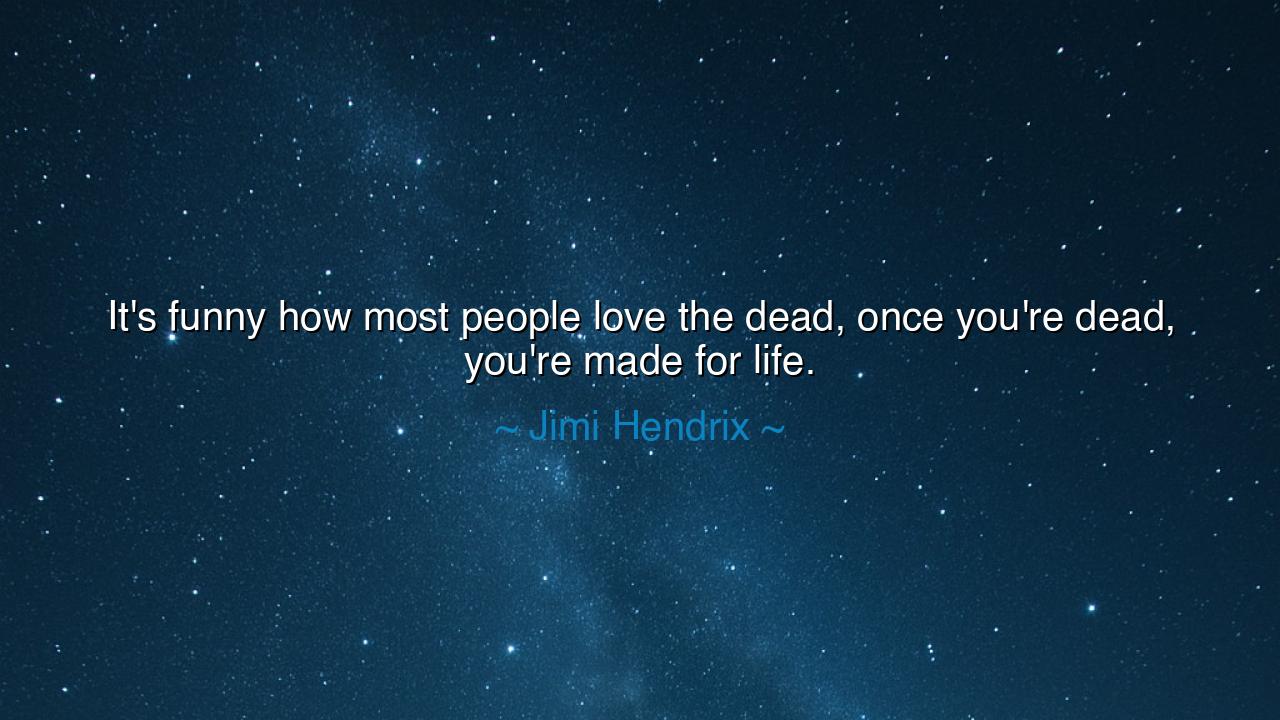
It's funny how most people love the dead, once you're dead






The musician-prophet Jimi Hendrix, whose guitar once spoke with the voice of thunder and lamentation, once said: “It’s funny how most people love the dead; once you’re dead, you’re made for life.” In this paradox, he speaks not only of fame and art, but of the human heart itself — how we often see most clearly only when the light has gone out. His words ring like a song of both irony and sorrow. They remind us that recognition, though praised as a blessing, often comes too late to be felt; that love withheld in life becomes worship after death. And so, in the laughter that begins his phrase — “It’s funny how…” — there is not mirth, but the bitterness of truth.
To love the dead is easier than to love the living. The dead cannot disappoint us, nor speak, nor change; they are safely preserved in memory, stripped of their flaws and frozen in ideal form. But the living — they are complex, unpredictable, flawed. Hendrix understood this deeply. In his short life, he walked among critics and doubters, mocked for his wildness, misunderstood by those who sought to tame his genius. Yet when he died, the world wept and called him a legend. What had been strange became sacred; what had been too loud became divine. Such is the strange cruelty of human admiration — it blooms only upon the grave.
The ancients, too, knew this pattern well. The philosopher Socrates was condemned by his own city, accused of corrupting the youth with his questions. Yet once he drank the poison, Athens mourned him as a martyr of wisdom. Galileo was silenced by the Church, only to be honored centuries later as the father of science. And so it goes — the prophet must die before his people call him holy. Hendrix’s words echo this eternal rhythm: the world often crucifies its visionaries and then builds temples to them afterward. The irony of fame is that immortality arrives when one no longer needs it.
There is, however, a deeper message beneath Hendrix’s lament. When he says, “Once you’re dead, you’re made for life,” he reveals an insight into how memory transforms mortality into myth. Death fixes a person’s image in place — no longer changing, no longer aging. The artist becomes eternal in the minds of those left behind. Their work, once questioned, becomes scripture; their voice, once ignored, becomes gospel. Hendrix himself, in speaking these words, unknowingly prophesied his own fate: dying young, he became immortal — a flame that burned too briefly to be forgotten. His quote, therefore, is both an accusation and a resignation — the recognition that death, cruelly, is the final agent of fame.
Consider also the story of Vincent van Gogh, who in his lifetime sold only one painting and lived in obscurity and madness. He was ridiculed for his style, misunderstood for his vision. But after his death, his art exploded across the world, and his name became synonymous with beauty and suffering. Van Gogh’s story, like Hendrix’s, reveals the blindness of society to the brilliance in its midst. The world, it seems, fears the living genius because it disrupts comfort, but loves the dead genius because it no longer demands change. The love of the dead, then, is not pure affection — it is a safe love, free of risk or responsibility.
Yet the teaching within Hendrix’s words is not one of despair but of awakening. If it is true that people are only loved fully when they are gone, then the challenge is to reverse that curse. To see the brilliance of those who walk among us now — to praise before the silence, to cherish before the absence. Let us not wait for funerals to speak gratitude, nor for obituaries to express admiration. The lesson is to live with awareness of impermanence and to offer honor in the present moment. Every artist, every friend, every soul we meet carries a fire that could vanish tomorrow. To love them now is to defy the blindness Hendrix lamented.
Therefore, my child, when you hear these words — “It’s funny how most people love the dead” — do not let them remain a tragic joke. Let them be a commandment. See the living, not the myth. Praise the imperfect. Thank those whose gifts enrich your days, while their hearts still beat. The poet, the teacher, the parent, the friend — do not wait for their silence to speak your love. For when we honor life while it lives, we break the cycle of forgetfulness. Then, and only then, do we transform Hendrix’s irony into truth not of sorrow, but of wisdom — proving that the living, too, can be “made for life.”






AAdministratorAdministrator
Welcome, honored guests. Please leave a comment, we will respond soon